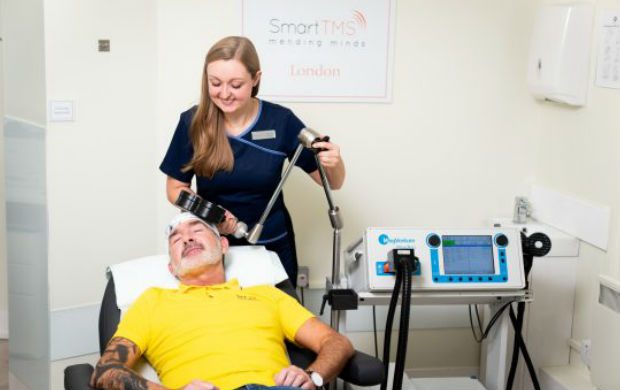What does Smart TMS offer and for what mental health conditions?
Smart TMS offers repeated transcranial magnetic stimulation (TMS) for a range of mental health conditions including depression, anxiety, OCD, alcohol and cocaine addiction, post-traumatic stress disorder. TMS, uses pulsing magnetic fields to activate or suppress the brain centres associated with a number of medical and psychiatric disorders. These magnetic fields are the same type and strength as those produced by magnetic resonance imaging (MRI) and are only applied to the brain areas associated with the condition being treated. The treatment was approved by the National Institute of Health and Care Excellence (NICE) in 2015 and has been shown to be effective by numerous studies.
How effective has the treatment been shown to be?
Since the therapy was invented in the 1980s, there have been numerous studies that support the effectiveness of TMS therapy for treating mental health conditions. In 2012 Carpenter reviewed 307 patients treated at 42 TMS clinics in the USA and found that the remission rate for patients with depression was 40% and 60% had a clinically significant response.
Smart TMS have conducted their own internal research and have found that:
For depression and anxiety, 75% of Smart TMS treated patients have had a reduction in symptoms of at least 30%.
For OCD, Smart TMS have found a remission rate of 38% with 35% of those treated showing a 40% reduction in symptoms and 42% of those treated showing a 30% reduction in symptoms.
For alcohol addiction, Smart TMS have found that TMS reduced alcohol cravings by 50% after two weeks.
For cocaine addiction, 73% of Smart TMS patients had zero cravings at the end of treatment.
How does it compare to other treatments for depression such as antidepressants and talking therapies?
They are both NICE approved, but the reported side effects of antidepressants include anxiety, diarrhoea, dizziness, fatigue, headache, increased appetite, migraine, nausea, sleep problems, sexual dysfunction and weight gain. There is good evidence that antidepressants and psychotherapies, such as cognitive behavioural therapy (CBT), are effective treatments. However, many people do not respond to these treatments. Only about 30% of people respond to a three-month course of antidepressants and, in the CoBalT study of people who had not responded to antidepressants, about half also did not respond to CBT. According to the guidance by NICE, prior to TMS therapy, psychological treatment should be provided first and this should include CBT with exposure and response prevention (ERP), administered by an experienced therapist.
Are there any side-effects?
The reported side effects of TMS therapy are mild fatigue and mild headaches which can be treated with painkillers. Unlike some other treatments, there is no recovery time needed from TMS therapy and patients can continue with their day immediately after therapy.
Where is the treatment available?
Smart TMS is the largest and fastest-growing network of TMS clinics throughout the UK & Ireland and there are currently clinics in Dublin, Edinburgh, Manchester, Birmingham, Bristol, London and Havant.








